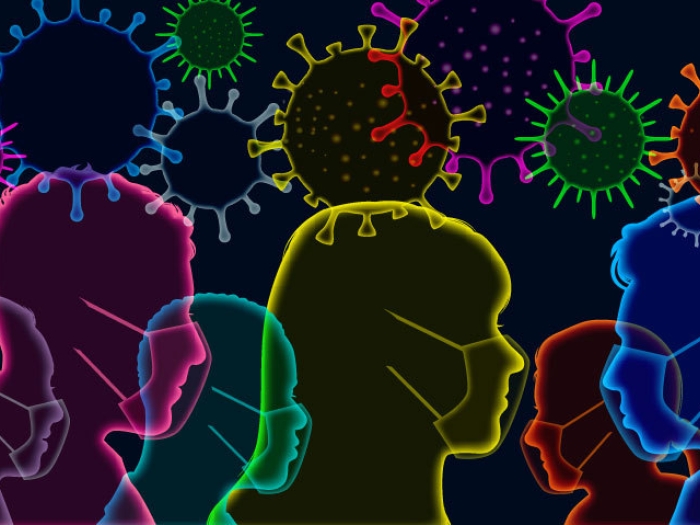Building on past research, U-M scientists propose a unified way to explain many of the symptoms and much of the neurobiology of PTSD.
1:00 PM
Author |

For decades, neuroscientists and physicians have tried to explain why only some people are vulnerable to post-traumatic stress disorder, and why they experience so many symptoms and so much disability.
MORE FROM THE LAB: Subscribe to our weekly newsletter
Experts in the field now agree that PTSD indeed stems from very real, physical processes within the brain — and not from some sort of psychological weakness.
But no clear consensus has emerged about what exactly those altered processes are.
In a perspective article published in Neuron, a pair of University of Michigan Medical School professors — who have studied PTSD from many angles for many years — say that people with PTSD appear to suffer from disrupted context processing. Context processing is a core brain function that allows people and animals to recognize that a particular stimulus may require different responses depending on its context. It's what allows us to call upon an appropriate emotional or physical response to every encounter we have.
The professors hope to stimulate interest in the theory and invite others in the field to test it.
A tale of two lions
A simple example, they write, is recognizing that a mountain lion seen in a zoo does not require the same fear-or-flight response as it would when unexpectedly encountered in the wild.
For someone with PTSD, a stimulus associated with the trauma they previously experienced — such as a loud noise or a particular smell — triggers a fear response even when the context is safe. That's why they react even if the loud noise came from the front door being slammed and not a gunshot, or the smell comes from dinner being accidentally burned on the stove and not a fire.
Context processing involves the brain's hippocampus, and its connections to two other regions, the prefrontal cortex and the amygdala.
Research has shown that activity in these brain areas is disrupted in PTSD patients. The U-M team believes their theory can unify wide-ranging evidence by showing how a disruption in this circuit can interfere with context processing and can explain most of the symptoms and much of the biology of PTSD.
"We hope to put some order to all the information that's been gathered about PTSD from studies of human patients, and of animal models of the condition," says Israel Liberzon, M.D., a professor of psychiatry at U-M and a researcher at the VA Ann Arbor Healthcare System who also treats veterans with PTSD.
"We hope to create a testable hypothesis, which isn't as common in mental health research as it should be. If this hypothesis proves true, maybe we can unravel some of the underlying pathophysiological processes and offer better treatments."
If this hypothesis proves true, maybe we can unravel some of the underlying pathophysiological processes and offer better treatments.Israel Liberzon, M.D.
A unifying theory of PTSD
Liberzon and his colleague, James Abelson, M.D., Ph.D., describe models of PTSD that have emerged in recent years and lay out the evidence for each. The problem, they say, is that none sufficiently explain the various symptoms, nor all of the complex neurobiological changes seen in patients with PTSD and in animal models of this disorder.
The first model, abnormal fear learning, is rooted in the amygdala — the brain's 'fight-or-flight' center — which focuses on responses to threats or safe environments. This model emerged from work on fear conditioning, fear extinction and fear generalization.
The second, exaggerated threat detection, is rooted in the brain regions that figure out what signals from the environment are "salient," or important to take note of and react to. This model focuses on vigilance and disproportionate responses to perceived threats.
The third, involving executive function and regulation of emotions, is mainly rooted in the prefrontal cortex — the brain's center for keeping emotions in check and planning or switching between tasks.
By focusing only on the evidence bolstering one of these theories, researchers may be "searching under the streetlight," says Liberzon. "But if we look at all of it in the light of context processing disruption, we can explain why different teams have seen different things. They're not mutually exclusive."
The main thing, says Liberzon, is that "context is not only information about your surroundings — it's pulling out the correct emotion and memories for the context you are in."

That 'unmoored' feeling
A deficit in context processing can lead people with PTSD to feel "unmoored" from the world around them, unable to shape their responses to fit their current contexts. Instead, their brains would impose an internalized context — one that always expects danger — on every situation.
SEE ALSO: The ImPAT Approach: Treating Pain Without Opioids
This type of deficit, arising in the brain from a combination of genetics and life experiences, may create vulnerability to PTSD in the first place, they say. After trauma, this would generate symptoms of hypervigilance, sleeplessness, intrusive thoughts and dreams, and inappropriate emotional and physical outbursts.
Liberzon and Abelson say that testing the context processing theory will enhance understanding of PTSD, even if all of its details are not verified. They hope the PTSD community will help them pursue the needed research, in PTSD patients and in animal models. They put forth specific ideas in the Neuron paper to encourage that, and are embarking on such research themselves.
The U-M/VA team is currently recruiting people with PTSD — whether veterans or not — for studies involving brain imaging and other tests. Anyone interested may call 734-232–0190.
In the meantime, they note that there is a growing set of therapeutic tools that can help patients with PTSD, such as cognitive behavioral therapy, mindfulness training and pharmacological approaches. These may work by helping to anchor PTSD patients in their current environment, and may prove more effective as researchers learn how to specifically strengthen context processing capacities in the brain.

Explore a variety of health care news & stories by visiting the Health Lab home page for more articles.

Department of Communication at Michigan Medicine
Want top health & research news weekly? Sign up for Health Lab’s newsletters today!





